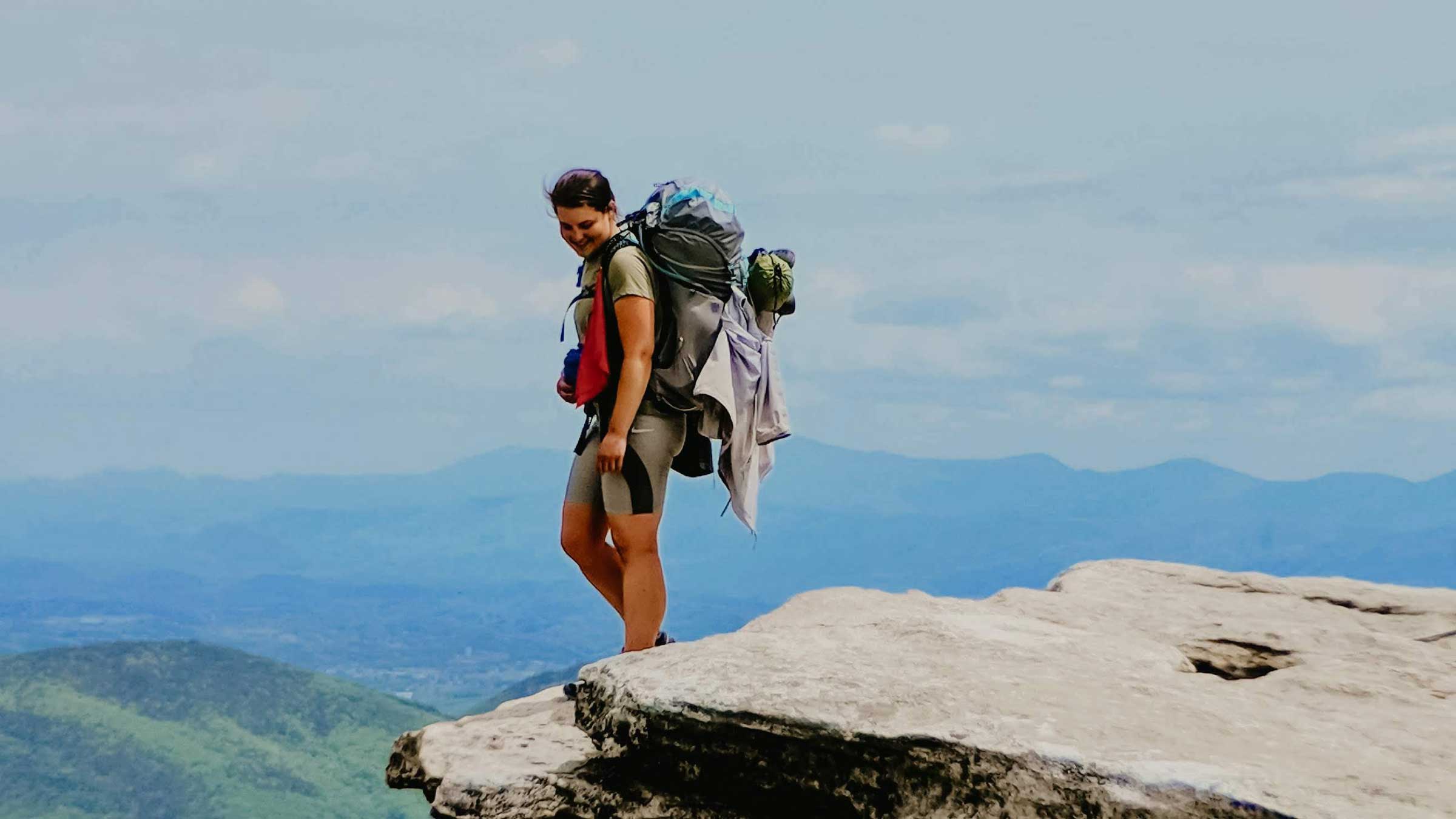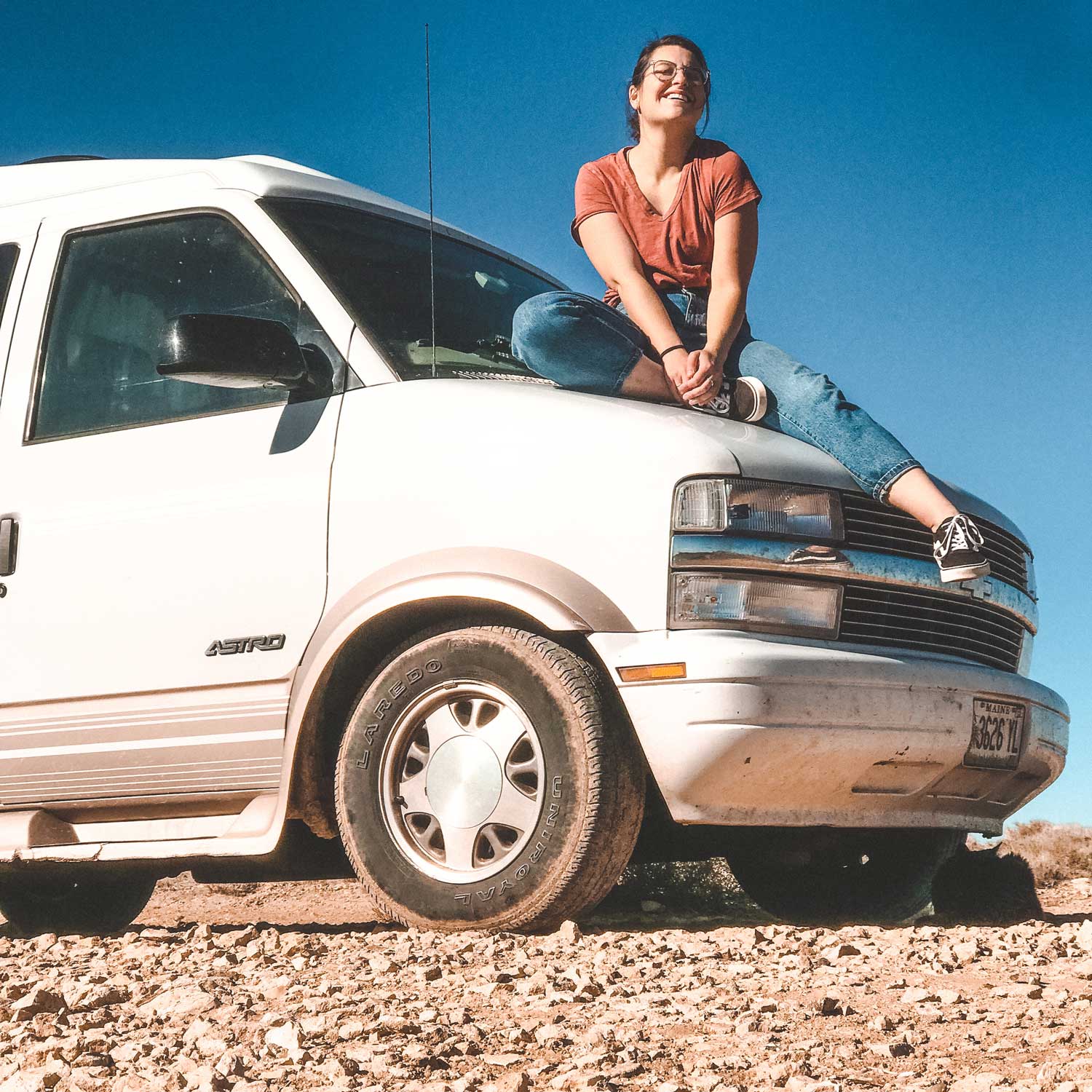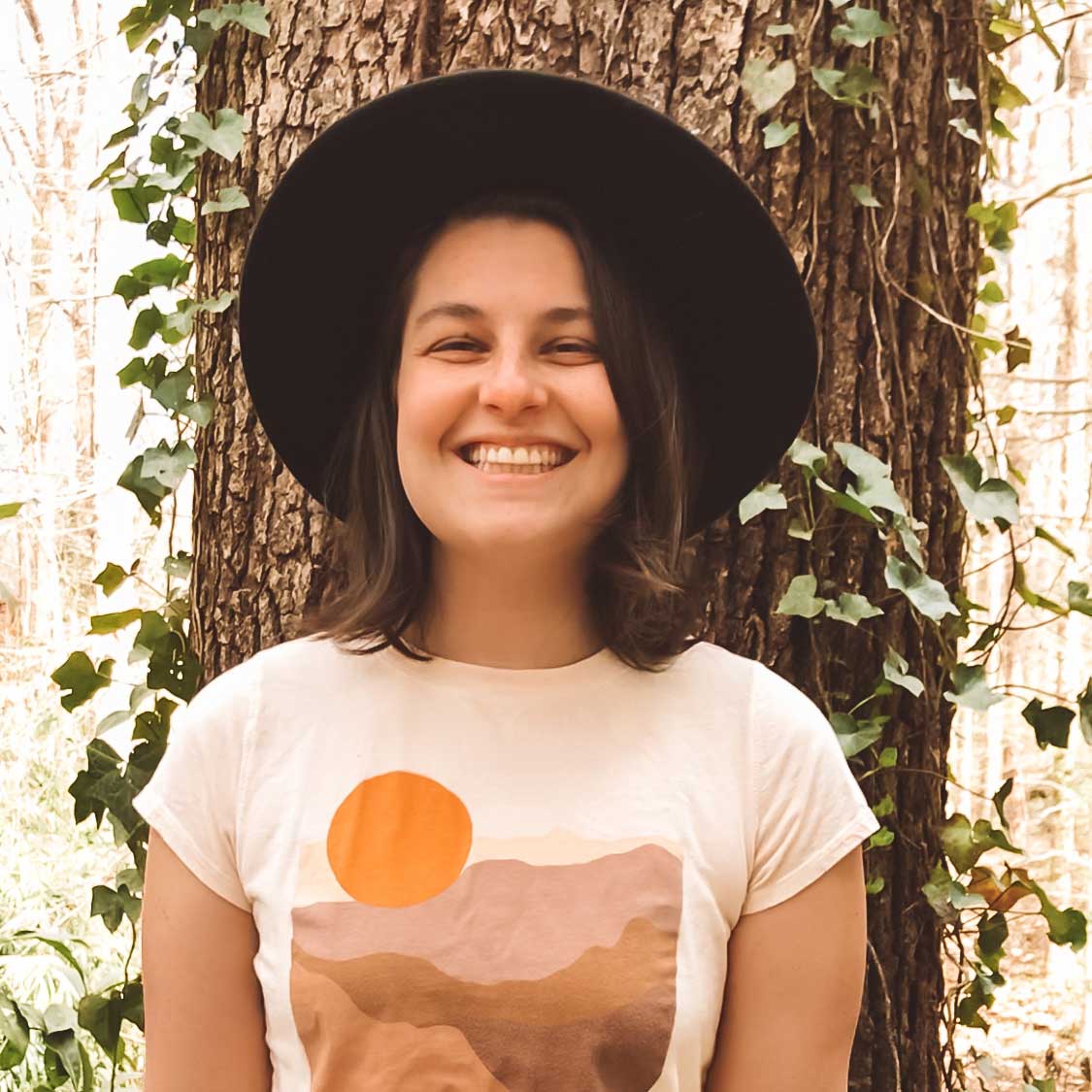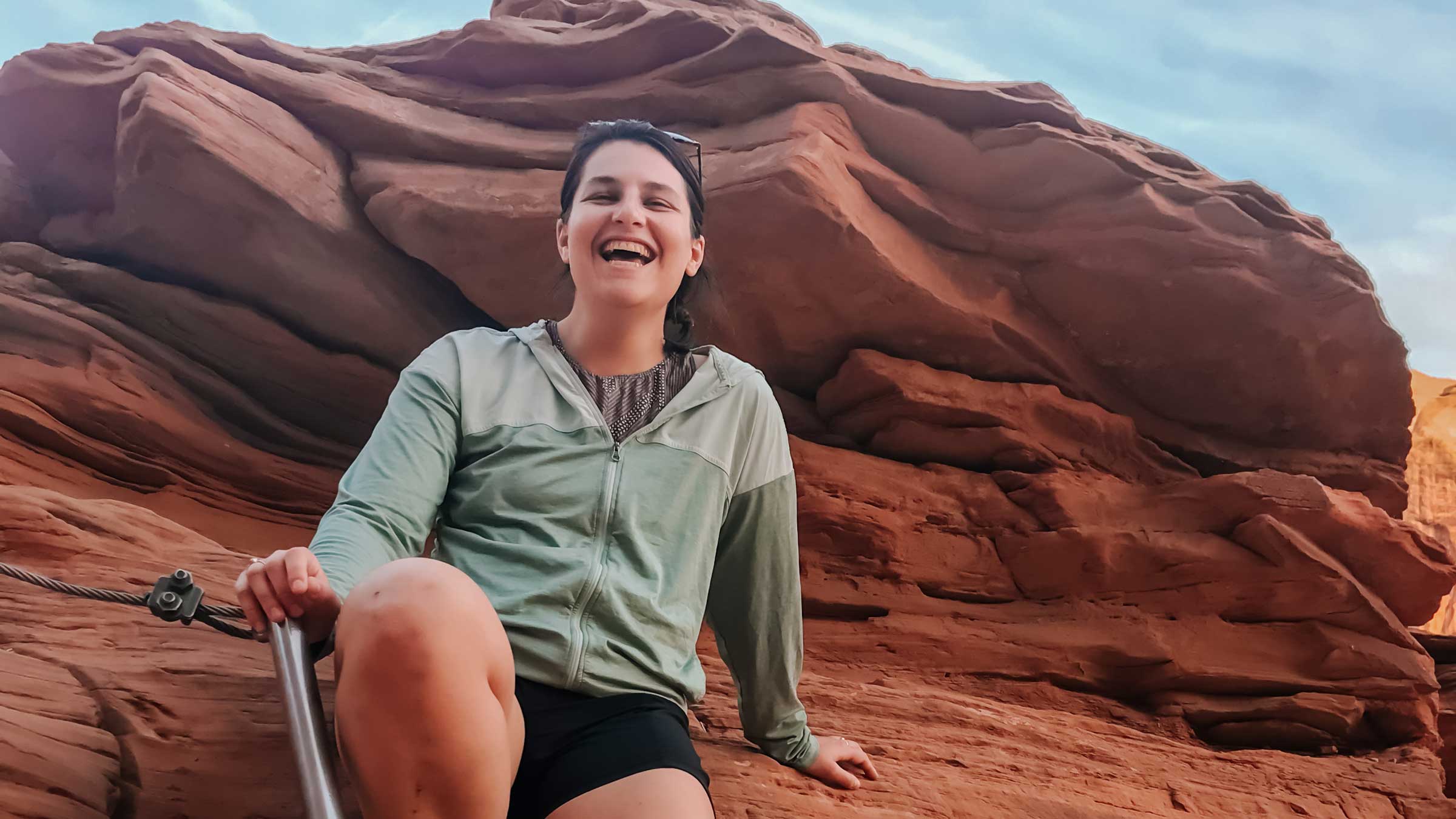Meet Rachel Meltzer. Rachel is a bubbly, confident, badass writer and coach. She loves talking about freelance businesses (which is why she has her own podcast about it called The Guidebook) and supporting other people in achieving their vision of success in the freelance world. She’s also wicked smart when it comes to her own writing business, producing top-notch email marketing copy, e-books, blog posts, and much more. Plus, did I mention she lived in a van for a year, thru-hiked the Appalachian Trail, and rock climbs?
In this interview, Rachel is amazingly honest and upfront about her journey into freelancing with all the ups and downs from burnout to making $7,000 to $15,000 per month.
Year started freelancing: 2017 (full-time 2020)
Age when started freelancing: 22 (full-time 25)
Preferred Pronouns: she/her

What’s your “about you” elevator pitch for what you do?
I am a freelance writer for software and tech companies. And I also teach other people how to become freelance writers.
How did you figure out what to include in that and make it so succinct?
Early on, I was using LinkedIn to get clients and I was doing direct outreach. I realized I wanted to have clients coming to me because it’s less effort, so I started treating LinkedIn like a search engine, optimizing my profile for LinkedIn search. So I experiment with my headline a lot and see which ones get me inquiries. Through that, I’ve generally landed on the title I have today, but I still edit it like every other week just to see what I get from it.
What did you do before freelancing?
Well, right before freelancing, I was a barista. I also worked part time at a gear shop because I wanted to hike the Appalachian Trail, so I got all my gear there for that hike, which I did during my first year of freelancing.
Before that, I worked in offices as a legal assistant. And before that I was a teacher part time, all the way through college. I had to do part time practicum because I was getting my teaching license and then I realized I didn’t want to be a teacher. So I sort of went through like three careers before 22 and realized that none of them were right for me and just wanted to abandon everything and go to the woods.
What made you decide to start freelancing?
I realized I needed something that wouldn’t tie me down to get what I wanted in life, which was thru-hiking and to live wherever I want—including being in a van.
I also just hate being on someone else’s schedule. I knew I wanted to do what I want when I want—which may be a product of my ADHD, I didn’t realize that was a thing back then. And yeah, I figured I got a lot of compliments for my writing during school, it must be something I can do to make money. Once I started, I realized it was marketing and that’s very different from academia, but yeah.
What did the start of your freelance journey look like?
I started off thru-hiking the Appalachian Trail and when I thru-hiked, I had a blog that I posted on everyday and I got sponsors for the blog, which was how I made money.
After the thru-hike, I worked like 70 hours a week trying to build my freelance business because I didn’t know what I was doing. I’d never done marketing writing. I didn’t know how to get clients. I was in my early twenties just like, figuring out how to live life, then on top of that I was trying to figure out how to have a business. It was a constant disaster of burning out, long break, burning out, etc. until I discovered retainer clients and went from drowning to swimming.
You lived in a van, how long were you in the van for?
I did it for a year. I bought it in February 2021, and moved out in January of 2022.

Between being in the van and not, did your freelancing life change?
Yes, a lot.
How so?
So once I’d saved up enough money to buy my $4,500 van, every month I would just spend time and money building the van. My dad ended up helping me build it a lot too. During that time, I was still working about 20 hours a week on client work.
Once I moved into the van and actually hit the road, I was like “holy shit, I don’t have time or energy to be working anything more than 20 hours a week.” Even that was hard because you’re in all these cool places and your brain is saying “we’re never going to be here again, so we should take advantage of it.” But your body and your work is like, “Hello? Do you know how to rest and work and eat properly?”
So I really just was focusing on experiencing where I was and the people I was meeting rather than work, but I was still working 17 hours a week with a retainer client and doing one big ad-hoc project a month.
By the time I stopped, I was so burned out. Like literally sick. Once my retainer contract ended, I basically didn’t work for three months and just lived off savings while staying in an Airbnb. I was unwell – mentally and physically. It was awful. I don’t recommend doing it that way, but you literally live and learn.
Now, I do writing work like 10-15 hours a week and coach 10-15 hours a week, so 20-30 hours total and I make anywhere from like $7,000 to $15,000 a month, with some random low months of like $3,000. And I actually don’t rely on retainers as much anymore, focusing more on ad-hoc writing work and recurring memberships for my coaching clients.
How did you transition to doing more of the coaching?
In 2020, I got laid off from my barista job—I had been freelancing part-time for almost three years at that point, so I knew what I was doing, I just didn’t know how to do it full-time yet.
I didn’t qualify for unemployment and I freaked out. I spent the first three months of that unemployed period ramping up my business to full-time and within three months, I had tripled my income and completely changed my business.
I got so good at getting clients that I overbooked myself and didn’t even realize it because I was so used to saying yes to whatever came my way. I had to start learning how to say no. So I was posting on LinkedIn like “Hey, I need a referral for this client I have to drop.” And I was posting like “I can’t believe I just tripled my income” and these sorts of things on Instagram. I started getting a lot of followers on Instagram. Then, people started reaching out and asking what I was doing.
I was working with a business coach at the time and she said, “you used to be a teacher, you love people, you’re burning out on writing, why don’t you start coaching to supplement your income?”
So I started out just doing like one-on-one stuff for anyone who asked. I’d do a free 20-minute session—I still do these—just to see if we’re a good fit, get to know the person, and see what they’re up to and if I can help them. Then I’d suggest what I thought the best option for them would be.
I just went from there, figuring out what people needed from me and creating that. So as people told me their problems and I helped them fix them, I started making resources, which has now become my Freelance Resource Library and I’ve literally been making that for four years and offering it with my community memberships and one-on-one coaching for free.
When I bought the van, I realized I couldn’t do one-on-one coaching with the energy and time I had, so I reached out to all my one-on-one clients who were at the end of my four- or eight-week program and asked if they wanted to be a part of a group I was starting. It’s much more affordable than one-on-one coaching and people would be able to make friends. Every single one of them said yes and that group has just been getting bigger and bigger.
You are outdoorsy, but most of your copywriting clients are not necessarily outdoorsy, right? Could you talk more about that?
When I started, my first clients were sponsors of my blog and that was great and all, but writing a blog every single day on your phone while you’re thru-hiking was hard and I got kind of annoyed with it sometimes. I was happy to do it because I wanted to record it for myself anyway and it was meaningful to other people. I also didn’t have enough money to finish the trail without it.
But I think it did detract from my experience at times. Like, I would be laying in a shelter and while everyone else was sleeping, I was writing a blog post on my phone; or I stayed at a hostel a couple extra days because they had a computer and I got my blogs up because it was way faster and easier to do on a computer even with satellite internet.
Through that, I realized that getting paid to write about your favorite hobby can kind of detract from it. And when I went full-time, I wanted to write for the outdoor industry, but I found it impossible to break into. None of my pitches even got responses no matter what I did and if I did get anything, it wasn’t enough money to live off of.
So I sort of randomly got a gig with a website about coding bootcamps on Upwork and I learned how to write a good SEO blog post through that client. I also learned that the coding boot camp industry is actually interesting enough to me to write about but detached enough from my life—it’s not ruining my hobbies. So I just kind of rolled with that and liked the separation.
I tried to use my lifestyle on Instagram to market my coaching, but I found that burnt me out a lot too. I just got fed up with it all and I took a big step back from sharing on Instagram and working in the outdoor industry.
Now I’ve slowly been coming back to it, through in-person networking and persistent follow-ups and getting small projects for small businesses in the outdoor industry. Almost every outdoor industry client I’ve gotten has been from in-person connections, being in the right place at the right time. Not because I’m more talented than somebody else or I pitched perfectly.
If you could give one piece of advice to a newer woman freelancer getting into the outdoor industry, what would it be?
I think the biggest thing I see people really struggle with is persistence. It’s really easy to get discouraged. The only reason I’m successful and I’m sitting in this position right now, is because I took a lot of baby steps. I followed up like seven to ten times with every single client I’ve ever gotten.
Basically, there are very few times I’ve ever gotten a client from like, no follow-up, or one or two follow-ups. Never take no for an answer. If you don’t get a response, it doesn’t mean anything. It just means they’re not ready to work with you yet.
It’s really easy when you don’t get responses to just give up or think that it’s not viable or stop believing in yourself. Sometimes you just need to experiment—target other clients or other industries or other services. Sometimes you just need to be more persistent and patient and follow-up. It is not impossible for anyone to make it in this business, you just can’t give up when something’s hard or not like what you expected.
If you don’t like freelancing, that’s fine, you don’t have to do it and that’s a good reason to stop. But not finding success quickly and easily is not. You’re going to come up against these speedbumps and roadblocks and you just have to do something about it.

Learn more about Rachel Meltzer
Want to get more time with Rachel? Here are a few ways you can get more of her insights and support her work.
- Check out her podcast The Guidebook
- Join her on an EPIC retreat this October.
- Follow her on LinkedIn (she writes some amazing posts!)
- Explore what coaching options she’s currently offering.
- Join Pop Club! (I recently joined myself and am finding value in it.)

